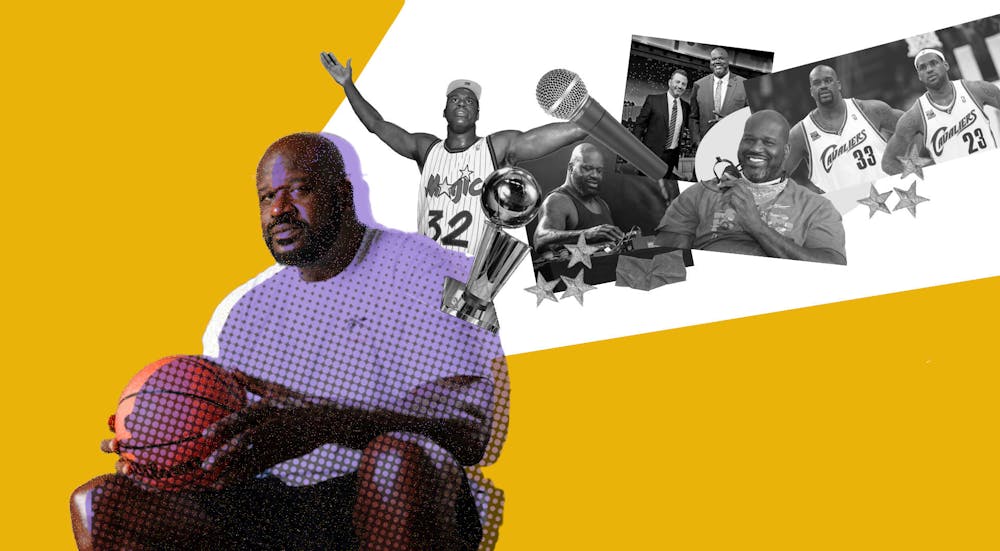Shaquille O’Neal—though most just know him as Shaq—announced his retirement from the NBA on June 1, 2011. For most players, this would mark the end; it would be the last time he commanded the public eye, the last time he was regularly watched by large swathes of the country, and the last time people would think about him. Sure, there might be an appearance every now and then, as they discuss a sports opinion on TV or appear in a random commercial. But—for the most part—celebrity status does not increase once a professional athlete retires.
But Shaq is no normal athlete. The last time he graced my television set was yesterday, as he appeared in several different commercials as diverse as Icy Hot, Pepsi, and Papa John’s. Beyond that presence as a barker for various brands, Shaq has built an incredible reputation and career as a retired player.
None of this discussion of Shaq as the pop culture icon is intended to diminish his greatness as a player. During his playing career—which spanned nearly two decades and earned him four NBA championships—he established himself as one of the greatest centers of all time, regularly showcasing his blend of strength, speed, and skill, which made him unguardable. He won four titles as a key contributor, and his place in basketball history will always be as sturdy as his bust in the Naismith Memorial Basketball Hall of Fame.
In one of his first ventures post–retirement, Shaq took one of the most traditional paths for a former professional athlete: television. Since 2011, he’s been a mainstay of Inside the NBA on TNT, appearing alongside fellow players Charles Barkley and Kenny Smith, as well as host Ernie Johnson. It is on this show that much of his personality has been revealed. There’s the funny side, representing the lumbering gentle giant—who may sometimes be a bit bumbling—which is the Shaq largely portrayed to the world. But in every biting joke or incisive piece of basketball analysis, much of his true genius comes to light.
This genius extends past the hardwood into the boardroom, and not just as a spokesperson. Shaq is currently the CEO of Reebok’s relaunched basketball division, attempting to breathe life into the shoe company whose sneakers he once wore on the court.
Shaq’s appearances on screens haven’t been restricted to commercials and NBA analysis, though. He’s been appearing in films and television shows, going back to his playing days. In 1997, Shaq played the lead role in Steel, one of the first major comic book movies to feature a black main character. While some of his other roles—like the hilariously mediocre–at–best Kazaam—were less than successful, Shaq has found an incredible niche, regularly appearing in cameo and voiceover roles.
But to find Shaq flexing his creative muscle these days, look to his career as a DJ and rapper. Often going under the name DJ Diesel, Shaq’s musical career began decades ago but is still continuing these days. He’s released several studio albums, and has appeared in the songs of many others, most recently a Rick Ross and Meek Mill collaboration aptly titled “Shaq and Kobe.” Plus, DJ Diesel has been enthralling college campuses regularly with his EDM sets and has appeared at several large music festivals, such as Lollapalooza or his own Shaq’s Bass All–Stars Festival.
This isn’t to say that other former athletes haven’t tried to have similar success after their playing days are done. The talent rosters of places like ESPN, Fox Sports, and more are filled with former athletes dispensing takes on the current stars of their teams. Retired athletes are centerpieces of several commercial campaigns, including the Nissan Heisman House series which appears regularly during college football season. Many others have appeared in movies—even as successfully as Michael Jordan in Space Jam—or have released music, like current NBA star Damian “Dame D.O.L.L.A.” Lillard. The thing is, no one has done it as successfully as Shaq.
Beyond just the money–making potential for these activities—and they are lucrative, with Shaq having a net worth of nearly half a billion dollars, significantly more than his career earnings as a basketball player—they also serve another purpose. His acting, DJing, and meme–inspiring appearances eating chicken wings on Hot Ones do key work keeping Shaq relevant and in the zeitgeist decades after his playing days ended. And as new generations less familiar with those past playing days come of age, these activities make sure that he will continue to be in the public eye in ways most ex–athletes can’t.
For me, Shaq will primarily be known forever as an NBA superstar. While I was too young to remember his terrifying peak years, I grew up on highlights of his dominant post game. But for others, he’s taken on different roles, whether that be as a musician, an analyst, or a spokesman. These are all valid, but there’s no denying that he was, continues to be, and will remain one thing: a celebrity.







